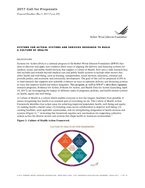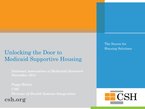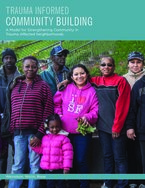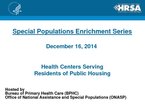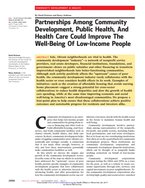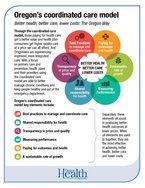0
Podcast
Community:
How should policymakers address the long-standing youth unemployment problem in Puerto Rico, which only worsened in the wake of Hurricanes Irma and Maria? After natural disasters, the government tends to focus its recovery efforts on infrastructure repairs and mental health services. But employment and economic security are equally important. With support from the W. T. Grant Foundation, MDRC partnered with Instituto del Desarrollo de la Juventud, or the Youth Development Institute, to develop recommendations that can create pathways into the workforce for young people and that are supported by evidence-based and promising practices relevant to the current situation in Puerto Rico.
Join Katie Beal as she talks to John Martinez, Director of Program Development at MDRC, about the recommendations we made to facilitate and support training and employment opportunities for young people in Puerto Rico, and the challenges of implementing those recommendations.
Authored by: MDRC
Topics: Low-income, Research, Workforce development, Youth
 Shared by Mica O'Brien
Shared by Mica O'Brien
Mica O'Brien posted a
on Nov 19, 2018
How should policymakers address the long-standing youth unemployment problem in Puerto Rico, which only worsened in the wake of Hurricanes Irma and Maria? After natural disasters, the government tends to focus its recovery efforts on infrastructure repairs and mental health services.
0
Publication
Community:
Resources and presentation slides
Authored by: Food Research & Action Center
Topics: Food insecurity, Housing, Immigrants, Legislation & Policy
 Shared by Mica O'Brien
Shared by Mica O'Brien
Mica O'Brien posted a
on Nov 15, 2018
Food Research & Action Center
Resources and presentation slides
0
Podcast
Community:
Nov 9, 2018
Aaron Freiwald, Managing Partner of Freiwald Law and host of the weekly podcast, Good Law | Bad Law, is joined by Vicki Been, the Boxer Family Professor of Law at NYU, to discuss the Fair Housing Act on this historic civil rights legislation’s 50th birthday. The FHA was signed by President Lyndon Johnson in the days following the assassination of Dr. Martin Luther King Jr.
Authored by: Good Law/Bad Law Podcast
Topics: Housing, Legislation & Policy, Racial inequalities, Research
 Shared by Mica O'Brien
Shared by Mica O'Brien
Mica O'Brien posted a
on Nov 14, 2018
Aaron Freiwald, Managing Partner of Freiwald Law and host of the weekly podcast, Good Law | Bad Law, is joined by Vicki Been, the Boxer Family Professor of Law at NYU, to discuss the Fair Housing Act on this historic civil rights legislation’s 50th birthday.
0
Podcast
Community:
Josie Williams, Project Coordinator at the Greensboro Housing Coalition, joined the podcast to discuss a BUILD-funded project called “Collaborative Cottage Grove” that is fostering resident-led efforts to improve poor housing conditions that are leading to asthma-related emergency department visits in the Cottage Grove neighborhood of Greensboro, NC. Motivated by a desire to improve conditions in neighborhoods similar to the one she grew up in, and guided by resident voices, Williams is working with multi-sector partners to map asthma hospital visits and housing condition data to identify areas in need of support. The collaborative is also in the process of developing an electronic referral system to link families with asthma education and housing assessments.
Authored by: All In: Data for Community Health
Topics: Asthma, Data sharing, Health, Housing, Partnerships
 Shared by Mica O'Brien
Shared by Mica O'Brien
Mica O'Brien posted a
on Nov 8, 2018
All In: Data for Community Health
Josie Williams, Project Coordinator at the Greensboro Housing Coalition, joined the podcast to discuss a BUILD-funded project called “Collaborative Cottage Grove” that is fostering resident-led efforts to improve poor housing conditions that are leading to asthma-related emergency department visits
0
Publication
Community:
Jan 1, 2018
More than 50 years after the passage of the Fair Housing Act, what would it take to meaningfully reduce residential segregation and/or to mitigate its negative consequences in the United States? In this volume, leading academics, practitioners, and policymakers grapple with this question, examining different aspects of the complex and deeply rooted problem of residential segregation and proposing concrete steps that could achieve meaningful change withing the next ten to fifteen years.
Authored by: Joint Center for Housing Studies of Harvard University
Topics: Community development, Legislation & Policy, Mobility, Place-based, Racial inequalities, Research
 Shared by Mica O'Brien
Shared by Mica O'Brien
Mica O'Brien posted a
on Oct 25, 2018
Joint Center for Housing Studies of Harvard University
More than 50 years after the passage of the Fair Housing Act, what would it take to meaningfully reduce residential segregation and/or to mitigate its negative consequences in the United States?
0
Publication
Community:
On September 20, 2018, a panel of researchers and practitioners discussed new research and ongoing challenges associated with the HCV program at HUD’s Quarterly Update from the Office of Policy Development and Research.
Authored by: PD&R Edge Online Magazine
Topics: Housing, Legislation & Policy, Low-income, Mobility, Racial inequalities, Research
 Shared by Mica O'Brien
Shared by Mica O'Brien
Mica O'Brien posted a
on Oct 10, 2018
PD&R Edge Online Magazine
On September 20, 2018, a panel of researchers and practitioners discussed new research and ongoing challenges associated with the HCV program at HUD’s Quarterly Update from the Office of Policy Development and Research.
0
Publication
Community:
The health care system is transforming to deliver value and maximize health across a patient’s lifespan. In this new landscape, there is rapid adoption of health technology to deliver patient-centered, whole person care. This issue brief explores elements for technology applications emerging to “close the loop” between clinical and community services and presents accelerators and challenges to their adoption.
Authored by: Nemours Children's Health Systems
Topics: Child welfare, Data sharing, Early childhood, Health, Partnerships, Youth
 Shared by Mica O'Brien
Shared by Mica O'Brien
Mica O'Brien posted a
on Oct 10, 2018
Nemours Children's Health Systems
The health care system is transforming to deliver value and maximize health across a patient’s lifespan. In this new landscape, there is rapid adoption of health technology to deliver patient-centered, whole person care.
0
Publication
Community:
Sep 1, 2018
This guide aims to provide resources and advice from the experiences of those in the NNIP network and other related organizations on developing a strong data governance program and protecting the security of confidential data.
Authored by: Leah Hendey, Amanda Gold, and Kathryn L.S. Pettit for National Neighborhood Indicators Partnership
Topics: Community development, Data sharing, Partnerships
 Shared by Mica O'Brien
Shared by Mica O'Brien
Mica O'Brien posted a
on Oct 10, 2018
Leah Hendey, Amanda Gold, and Kathryn L.S. Pettit for National Neighborhood Indicators Partnership
This guide aims to provide resources and advice from the experiences of those in the NNIP network and other related organizations on developing a strong data governance program and protecting the security of confidential data.
0
Podcast
Community:
Sep 12, 2018
Opportunity Zones have the potential to make a huge economic impact on disinvested communities across the country. Host Justin Milner speaks with researchers Brett Theodos and Brady Meixell on how this brand-new economic development initiative works, and how we’ll know if it’s truly successful.
Authored by: Urban Institute's Critical Value Podcast
Topics: Community development, Low-income, Mobility, Youth
 Shared by Mica O'Brien
Shared by Mica O'Brien
Mica O'Brien posted a
on Oct 10, 2018
Urban Institute's Critical Value Podcast
Opportunity Zones have the potential to make a huge economic impact on disinvested communities across the country. Host Justin Milner speaks with researchers Brett Theodos and Brady Meixell on how this brand-new economic development initiative works, and how we’ll know if it’s truly successful.
0
Publication
Community:
Young people are the workers of today and tomorrow. But those who become parents in their teenage years and early 20s, just as they are getting started in the world of work, are often confronted with a harsh reality: odds stacked against their ability to earn, learn and raise a family, which can threaten their children’s future as well as the strength of our communities.
Authored by: The Annie E. Casey Foundation
Topics: Early childhood, Education, Legislation & Policy, Post-secondary, Pre-natal, Research, Workforce development, Youth
 Shared by Mica O'Brien
Shared by Mica O'Brien
Mica O'Brien posted a
on Oct 10, 2018
The Annie E. Casey Foundation
Young people are the workers of today and tomorrow.
1
Publication
Community:
May 25, 2017
Neighborhoods are constantly changing as residents come and go, businesses open and close, and properties go up or come down. No place is the same for long. When community changes are widespread or stark, the conversation shifts from change to “gentrification,” the definition of which is often subject to debate. At its heart, gentrification happens when a low-income area that has experienced disinvestment attracts new economic investments and higher-income residents. But the benefits of these changes can be overshadowed by the perpetuation of disadvantage.
Authored by: How Housing Matters for The Urban Institute
Topics: Community development, Housing, Low-income, Mobility, Racial inequalities
 Shared by Mica O'Brien
Shared by Mica O'Brien
Mica O'Brien posted a
on Sep 27, 2018
How Housing Matters for The Urban Institute
Neighborhoods are constantly changing as residents come and go, businesses open and close, and properties go up or come down. No place is the same for long.
0
Podcast
Community:
Aug 15, 2018
Evidence shows that investing in children today can decrease poverty for the next generation of adults. Host Justin Milner speaks with researchers Heather Hahn and Cary Lou about the federal government’s current spending on kids, future projections for this spending, and what that means for America’s children.
Authored by: Urban Institute
Topics: Child welfare, Early childhood, Education, Funding, Legislation & Policy, Research, Youth
 Shared by Mica O'Brien
Shared by Mica O'Brien
Mica O'Brien posted a
on Sep 18, 2018
Evidence shows that investing in children today can decrease poverty for the next generation of adults.
0
Podcast
Community:
Sep 17, 2018
About MDRC’s “Evidence First” Podcast Series:
Policymakers talk about solutions, but which ones really work? Join Katie Beal, MDRC’s External Affairs Associate, as she talks with experts about the best evidence available on education and social programs that serve low-income people.
Authored by: Katie Beal with MDRC
Topics: Education, Funding, Legislation & Policy, Low-income, Post-secondary, Workforce development, Youth
 Shared by Mica O'Brien
Shared by Mica O'Brien
Mica O'Brien posted a
on Sep 17, 2018
About MDRC’s “Evidence First” Podcast Series:
Policymakers talk about solutions, but which ones really work? Join Katie Beal, MDRC’s External Affairs Associate, as she talks with experts about the best evidence available on education and social programs that serve low-income people.
0
Publication
Community:
Aug 9, 2018
Systems for Action (S4A) is a national program of the Robert Wood Johnson Foundation (RWJF) that aims to discover and apply new evidence about ways of aligning the delivery and financing systems for medical, social, and public health services that support a Culture of Health. This program, as well as RWJF’s other three signature research programs, Evidence for Action, Policies for Action, and Health Data for Action (launching April 19, 2017), are investigating the impact of different types of programs, policies, and health-related systems on health, equity and well-being.
Authored by:
Topics: Funding, Health, Housing, Partnerships, Research
 Shared by Housing Is
Shared by Housing Is
Housing Is posted a
on Aug 9, 2018
Systems for Action (S4A) is a national program of the Robert Wood Johnson Foundation (RWJF) that aims to discover and apply new evidence about ways of aligning the delivery and financing systems for medical, social, and public health services that support a Culture of Health.
0
Publication
Community:
Aug 9, 2018
Introduction to supportive housing and notes from the field
Authored by:
Topics: Health, Housing, Low-income, Medicaid / Medicare, Mental health, Partnerships, Supportive housing
 Shared by Housing Is
Shared by Housing Is
Housing Is posted a
on Aug 9, 2018
Introduction to supportive housing and notes from the field
0
Publication
Community:
Aug 9, 2018
Trauma is a set of normal human responses to stressful and threatening experiences (National Center for PTSD, 2007). Low-income and public housing residents may experience cumulative trauma resulting from daily stressors of violence and concentrated poverty, as well as historic and structural conditions of racism and disenfranchisement. We present a model of Trauma Informed Community Building (TICB) that addresses the challenges trauma poses to traditional community building strategies. TICB strategies de-escalate chaos and stress, build social cohesion and foster community resiliency over time.
Authored by:
Topics: Community development, Housing, Low-income, Mental health, Racial inequalities
 Shared by Housing Is
Shared by Housing Is
Housing Is posted a
on Aug 9, 2018
Trauma is a set of normal human responses to stressful and threatening experiences (National Center for PTSD, 2007).
0
Publication
Community:
Aug 9, 2018
This short document provides basic information to help housing and homeless assistance providers advocate with their families and youth for appropriate educational services, from birth through higher education. The rights and protections outlined here apply to all children and youth experiencing homelessness, as defined by the education subtitle of the McKinney-Vento Act.
Authored by: SchoolHouse Connection
Topics: Child welfare, Early childhood, Education, Homelessness, Legislation & Policy, Low-income, School-readiness
 Shared by Housing Is
Shared by Housing Is
Housing Is posted a
on Aug 9, 2018
This short document provides basic information to help housing and homeless assistance providers advocate with their families and youth for appropriate educational services, from birth through higher education.
0
Publication
Community:
Jul 27, 2018
Anthem’s affiliated health plans and other managed care organizations (MCOs) increasingly are helping Medicaid members who are diagnosed with mental health conditions and substance use disorders (MH/SUD) find stable housing, secure meaningful employment, and address a range of financial and daily life challenges.
Authored by:
Topics: Affordable Care Act, Cost effectiveness, Depression, Funding, Health, Housing, Medicaid / Medicare, Mental health, Nutrition, Substance abuse, Supportive housing, Workforce development
 Shared by Housing Is
Shared by Housing Is
Housing Is posted a
on Jul 27, 2018
Anthem’s affiliated health plans and other managed care organizations (MCOs) increasingly are helping Medicaid members who are diagnosed with mental health conditions and substance use disorders (MH/SUD) find stable housing, secure meaningful employment, and address a range of financial and daily li
0
Publication
Community:
Jul 27, 2018
Authored by:
Topics: Asthma, East Coast, Health, Healthy homes, Housing, Low-income, Partnerships, Supportive housing
 Shared by Housing Is
Shared by Housing Is
Housing Is posted a
on Jul 27, 2018
0
Publication
Community:
Jul 27, 2018
For fiscal year 2013, the Department requests $2.07 billion for the Public Housing Capital Fund to address development, rehabilitation, modernization and preservation needs of the Public Housing portfolio. While funding the Capital Fund at the requested level of $195 million over the fiscal year 2012 appropriation will not enable PHAs to meet all existing capital and accrual needs for fiscal year 2013, funding at this level will provide PHAs with some ability to prevent their housing stock from falling into a state of obsolescence, disrepair, and/or removal from inventory.
Authored by:
Topics: Funding, Green, Legislation & Policy, MTW, Sustainability
 Shared by Housing Is
Shared by Housing Is
Housing Is posted a
on Jul 27, 2018
For fiscal year 2013, the Department requests $2.07 billion for the Public Housing Capital Fund to address development, rehabilitation, modernization and preservation needs of the Public Housing portfolio.
0
Publication
Community:
Jul 27, 2018
On January 1, 2014, in states that have chosen to expand Medicaid eligibility under the Affordable Care Act, nearly all chronically homeless people who lacked health insurance became eligible for Medicaid. This Primer offers state Medicaid officials and other interested parties strategies for using Medicaid to meet the needs of this very vulnerable population--some strategies that have succeeded in the past and some that are emerging under provisions of the Affordable Care Act.
Authored by:
Topics: Affordable Care Act, Criminal justice, Disabilities, Dual-eligibles, Funding, Health, Homelessness, Housing, Low-income, Medicaid / Medicare, Mental health, Partnerships, Stability, Substance abuse, Supportive housing
 Shared by Housing Is
Shared by Housing Is
Housing Is posted a
on Jul 27, 2018
On January 1, 2014, in states that have chosen to expand Medicaid eligibility under the Affordable Care Act, nearly all chronically homeless people who lacked health insurance became eligible for Medicaid.
0
Publication
Community:
Jan 1, 2018
SAHF members believe that connecting residents of affordable housing with needed supports – such as educational resources or health services – can help vulnerable families and seniors achieve
a better quality of life. SAHF began the Outcomes Initiative to create a common framework for its members to demonstrate with data the impact on residents of providing housing-based services and support in the five key areas listed below.
Authored by: Stewards of Affordable Housing for the Future (SAHF)
Topics: Asset building, Cost effectiveness, Dual-generation, Education, Exercise, Food insecurity, Health, Housing, Mental health, Metrics, Nutrition, Safety, Stability
 Shared by Housing Is
Shared by Housing Is
Housing Is posted a
on Jul 26, 2018
Stewards of Affordable Housing for the Future (SAHF)
SAHF members believe that connecting residents of affordable housing with needed supports – such as educational resources or health services – can help vulnerable families and seniors achieve
a better quality of life.
0
Publication
Community:
Jul 24, 2018
The community development “industry”—a network of nonprofit service providers, real estate developers, financial institutions, foundations, and government—draws on public subsidies and other financing to transform impoverished neighborhoods into better-functioning communities. Although such activity positively affects the “upstream” causes of poor health, the community development industry rarely collaborates with the health sector or even considers health effects in its work. We propose a four-point plan to help ensure that existing and future collaborations achieve positive outcomes and sustainable progress for residents and investors alike.
Authored by:
Topics: Community development, Food insecurity, Funding, Health, Low-income, Partnerships, Supportive housing, Transportation
 Shared by Housing Is
Shared by Housing Is
Housing Is posted a
on Jul 24, 2018
The community development “industry”—a network of nonprofit service providers, real estate developers, financial institutions, foundations, and government—draws on public subsidies and other financing to transform impoverished neighborhoods into better-functioning communities.
0
Publication
Community:
Jul 24, 2018
Through the coordinated care model, those paying for health care get a better value and health plan consumers get higher quality care at a price we can all afford. And Oregonians are experiencing improved, more integrated care. With a focus on primary care and prevention, health plans and their providers using the coordinated care model are able to better manage chronic conditions and keep people healthy and out of the emergency department.
Authored by:
Topics: Cost effectiveness, Data sharing, Health, Metrics, Partnerships
 Shared by Housing Is
Shared by Housing Is
Housing Is posted a
on Jul 24, 2018
Through the coordinated care model, those paying for health care get a better value and health plan consumers get higher quality care at a price we can all afford. And Oregonians are experiencing improved, more integrated care.
0
Publication
Community:
Jul 23, 2018
Both the Centers for Medicare & Medicaid Services (CMS) and New York State (NYS) have embarked on an ambitious journey to improve outcomes for patients and populations, reward the delivery of high value care by providers, and increase long-term financial sustainability. In this document, New York State presents an approach to maximally align CMS’ payment reform efforts for Medicare to the NYS’ Medicaid Payment Reform Roadmap which has recently been approved by CMS.
Authored by:
Topics: Funding, Low-income, Medicaid / Medicare, Partnerships
 Shared by Housing Is
Shared by Housing Is
Housing Is posted a
on Jul 23, 2018
Both the Centers for Medicare & Medicaid Services (CMS) and New York State (NYS) have embarked on an ambitious journey to improve outcomes for patients and populations, reward the delivery of high value care by providers, and increase long-term financial sustainability.




 Shared by Housing Is
on Aug 9, 2018
Shared by Housing Is
on Aug 9, 2018
 Shared by Housing Is
on Aug 9, 2018
Shared by Housing Is
on Aug 9, 2018
 Shared by Housing Is
on Aug 9, 2018
Shared by Housing Is
on Aug 9, 2018
 Shared by Housing Is
on Aug 9, 2018
Shared by Housing Is
on Aug 9, 2018
 Shared by Housing Is
on Jul 27, 2018
Shared by Housing Is
on Jul 27, 2018
 Shared by Housing Is
on Jul 27, 2018
Shared by Housing Is
on Jul 27, 2018
 Shared by Housing Is
on Jul 27, 2018
Shared by Housing Is
on Jul 27, 2018
 Shared by Housing Is
on Jul 27, 2018
Shared by Housing Is
on Jul 27, 2018
 Shared by Housing Is
on Jul 26, 2018
Shared by Housing Is
on Jul 26, 2018
 Shared by Housing Is
on Jul 24, 2018
Shared by Housing Is
on Jul 24, 2018
 Shared by Housing Is
on Jul 24, 2018
Shared by Housing Is
on Jul 24, 2018
 Shared by Housing Is
on Jul 23, 2018
Shared by Housing Is
on Jul 23, 2018




